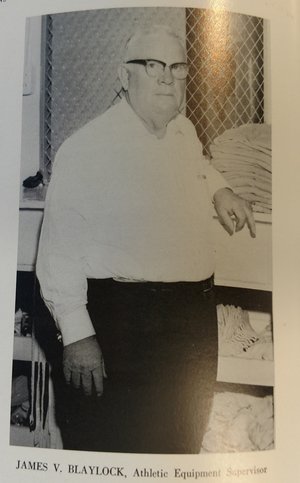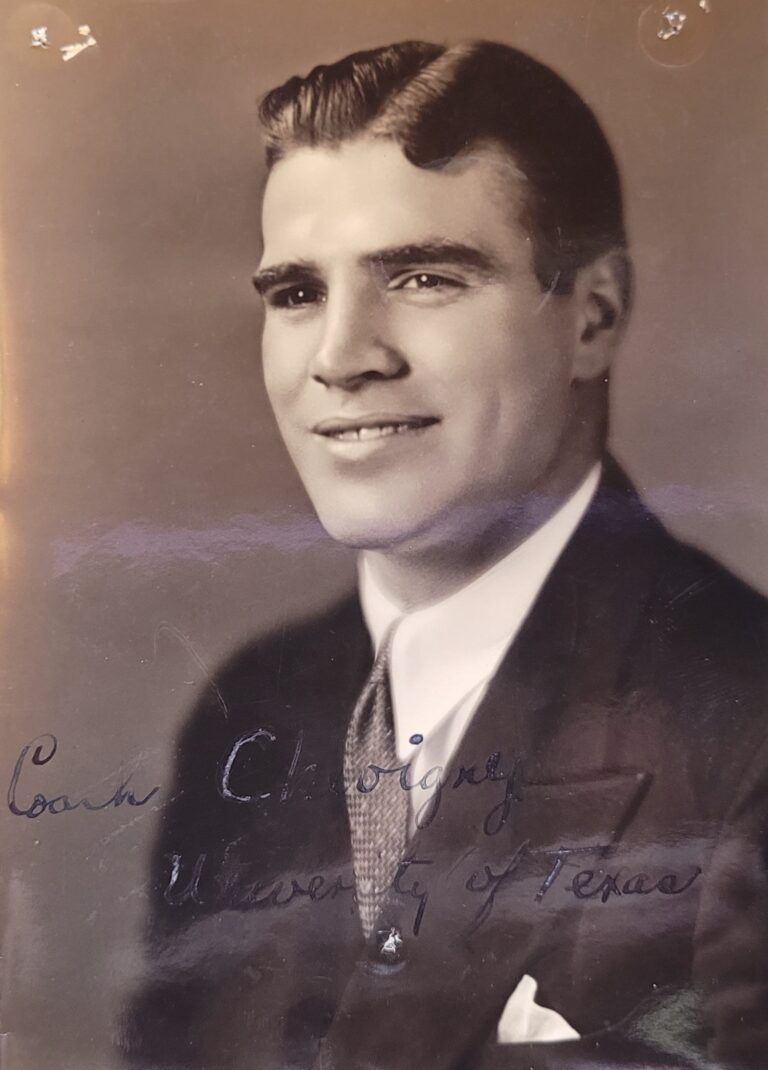Bill Little Articles XVII
Bill Little articles For https://texassports.com–
-
Life is What you Choose it to be
-
Run Toward the Roar
-
The Magic Switch
-
Learning from Memories
-
The Challenge
-
Believing you can
-
Driving on
-
11.05.2010 | Football
Bill Little commentary: Run toward the roar
Nov. 5, 2010
Bill Little, Texas Media Relations
MANHATTAN, KS – If you wonder about the validity of that fellow who wrote about “the best laid plans…” going awry, try this: a trip that was marked as a potential “trap game” for the Texas Longhorns at the start of the 2010 season is now a venue where the Longhorns are going to try to heal themselves. And perhaps that is the best message of all.
Sometimes, when you go in search of yourself, you have to do it alone.
That is not to discount, of course, the several thousand loyal Longhorn fans – which includes parents and a scaled down version of the Longhorn band and cheer and pom – who will accompany the team to Kansas on Saturday.
The point is, Texas is going into a place that arguably has been the toughest place for it to play in the Big 12. It goes there stripped of all of the trappings of a team which played for the national championship just ten months ago. The Longhorns are no longer in contention for a BCS bid, or (barring unforeseen developments in the balanced zone) even the South Division of the Big 12. Texas is 4-4, heading into a place where not many good things have happened for the Longhorns. And that is exactly the reason they should go there.There is a story that is told about the hunting habits of the lions. It goes like this: there is a great canyon with an opening at either end. The prey is in the canyon. The old, majestic lions have passed their time as great hunters. They have lost their speed, their teeth and their senses are worn. With them are the cubs–the young lions who are quick and swift, but haven’t yet learned to stalk their victims.
So the young lions go to one end of the canyon, and the old lions to the other. The only weapon left to the kings of the “kings of the beasts” is a menacing roar. It is scary, but it can’t hurt you. But when the old lions roar, the animals they are after scare, and run to the other end of the canyon. There, the young lions pounce them, and dinner is served.
The moral of the story is “run toward the roar.” Face your fear.
That is what Texas must do Saturday in Manhattan. What once seemed a “trap” is in fact, an opportunity.
With the series of weird things which have happened when Texas has visited Manhattan, it is the perfect place to be. Because it is the challenge that brings a team together.
The Longhorns are 1-3 in Manhattan against the Wildcats. Way back in 1926, Texas came to Manhattan to play what was then Kansas A&M. That was the first of a series that would define “strange” in the Flint Hills of Kansas.
The Texas coach, E. J. “Doc” Stewart, aimed to outsmart the Kansans on that trip. At the time, Texas had some players who were bigger than those on most teams, and Stewart wanted to inspire overconfidence from the home team. So on the train trip to Manhattan he had the engineer make a stop at the town before Manhattan, and he had his heavyweights get off the train. When Texas arrived, his plan had worked – the Longhorn team looked small to their opponents. Then the big guys came.
Things were rolling pretty well, until Kansas A&M decided to pull some tricks of their own. In the second half, they sprang a passing attack, legally (at the time) knocking down UT defenders to assure success. Two short TD passes led to a 13-3 upset, and Texas complained bitterly about the officiating when the team returned to Austin.
The two schools did not play again in Manhattan until 1998, when Mack Brown took his first Texas team there for Coach Brown’s first-ever Big 12 game. The heavily favored Wildcats proved why they were the nation’s No. 5 ranked team with a 48-7 victory.
The next trip there proved to be by far the best game of the meetings between the two schools. In 2002, the No. 8 Longhorns were coming off of a loss to Oklahoma when they came to Manhattan to play the No.17 Wildcats. Both teams were 5-1 on the year, and both were 1-1 in league play.
Most impressive about that contest was the caliber of players on the field for both teams. The offensive stars that night were a couple of guys who are still playing in the NFL. Darren Sproles was the running back for Kansas State, and Cedric Benson was the rushing leader for Texas. Chris Simms was the quarterback for Texas and Ell Roberson was the signal caller for K-State. The star-studded lineups also included future NFL defensive stars like Cory Redding, Derrick Johnson and Nathan Vasher for Texas, and Terence Newman for Kansas State. B. J. Johnson and David Thomas caught touchdown passes for Texas. Marcus Tubbs, who is now the Special Assistant for Player Relations for the UT football program, played several years at Seattle until injuries short circuited his career. The difference in the game, as the clock ran down, was a 27-yard field goal by Dusty Mangum with only a minute and 32 seconds left in the game. But what happened next was what mattered most. Newman returned the ensuing kickoff 33 yards, and the Wildcats started their final drive at their own 37.
It took eight plays–including two sacks by Texas and pass completions of 27 and 15 yards by Kansas State – until two incomplete passes left the Wildcats at the Texas 18 with only seven seconds on the clock. K-State’s Jered Brite lined up for a 36-yard field goal, aided by that north wind. On the sidelines, Mack Brown was already thinking ahead to what would be his first-ever overtime game.
But that was when Tubbs had other plans. Using his strength, with a little help from his high school basketball playing days, Marcus crashed through the middle of the K-State protection and with one giant swat blocked the kick. Texas had won, 17-14.
The last trip to Manhattan, of course, was a heartbreaker for the Longhorns in 2006. Ranked No. 4 in the country, the Longhorns were poised to move even higher when kickoff came on a bitterly cold night in Manhattan. It appeared Texas had things well in hand when freshman quarterback Colt McCoy took the team on an easy opening drive for a score. But McCoy suffered a shoulder injury as he scored the first TD of the game. From there, it turned into a wild shootout, which K-State won, 45-42.
Now, Texas heads to Manhattan as a team regrouping. This one isn’t about a title, or even a ranking. Under the cloak of night in the Flint Hills, the Longhorns are set on changing the dynamic of the season in their final four games of the regular campaign of 2010. To do it, you have to decide who you are, and the price you are willing to pay to move forward. You have to see if the effort extended in practice is going to translate into success in a game.
Most of all, in the midst of what can be a scary place, you have to remember this is a game, and it should be played for fun. Accept the challenge for what it is–a challenge. Meet it accordingly. Run toward the roar.
10.24.2010 | Football
Bill Little commentary: The magic switch
Oct. 24, 2010
Bill Little, Texas Media Relations
I’m going to tell this story again because it fits. Once, on a trip back from a basketball game in Iowa (of all places), our seasoned airline pilot backed the plane away from the terminal, and turned in the light snow to head to Dallas–and he hit the jet bridge with the tip of the plane’s wing.
As we realized that we were going to have to wait for another aircraft to take us to Dallas, where we would have to spend an unexpected extra night on the road, the captain calmly came over the plane’s speakers. After apprising us of the situation, he finished his statement with these words: “no explanation…no excuses.”
If your cell phone inexplicably locks, they tell you to take out the battery, wait a minute, and then put it back. When your computer doesn’t work right, the IT support people first have you unplug it and then plug it back in.
Coaches don’t have that luxury. In the world of human behavior, Mack Brown has called it “responsibility without control.”
Saturday had begun at Darrell K Royal-Texas Memorial Stadium with a pre-game delay and warnings of a storm that never came. It was an omen for a day that, for Texas, never seemed to get started.
All week Mack had tried to tell his team, and all those associated with Burnt Orange, that this 2010 football team needed to play hard and well to win. Not just all the games…ANY game. He knew that coming off of a great road win over Nebraska that his team would be praised, and feel good about itself. He never bought in to the general consensus that a magic switch had been found, and that this team – which had lost back-to-back games a week before to UCLA and Oklahoma – was suddenly the Longhorns of 2008 and 2009, which had lost two games in two years. “This team,” he had said, “is not good enough to just walk out there and assume a win. We could win the rest of our games, or we can lose the rest of our games, depending on how we play.”
He knew that Iowa State would come in and play with passion. The Cyclones had beaten Nebraska in Lincoln last season, and they had been embarrassed in their previous two games. They had never beaten Texas. Ever. In pre-game warm-ups, Mack didn’t like what he saw. After a week of good practice, his team seemed to be complacent.
“Arrogance,” is what he would call it in his post game interview.
Being a coach is like being a parent, and if you have raised kids, you know exactly what he saw. And if you think these guys aren’t “kids,” think again. There are no humans smarter, or parents dumber, than the blessed age of teenager to about 21 or 22 years old. After that, they figure out that maturity does, after all, have wisdom. That’s not a bad thing, it is just a true thing. They simply don’t think it can happen to them.
It doesn’t help much to remind yourself that this kind of thing is happening all over America. In fact, things are so topsy-turvy in college football this season that after Nebraska’s defeat of Oklahoma State and Missouri’s win over Oklahoma, the Longhorns – with two defeats – are still mathematically in the race for the Big 12 South Division title. In the final moments of the Big 12, the South Division is looking like the North did those many years, when every team was about the same.
What is important here, as the team and coaches try to figure out how to get there from here, is to appreciate the great run Texas has had. This team, and this staff, are not ready to give up on what has been the longest era of sustained success in school history.
That is why Brown spoke Saturday of his resolve to get “this thing” fixed. It’s why he is mystified by a defense that stops Nebraska and then surrenders 80 and 90 yard drives to a team that will finish no better than fourth in the six team North Division. It’s why he calls “unacceptable” an offense which has averaged 40 points per game in recent years but puts only 21 on the board against a team its archrival thrashed 52-0 the week before.
It is pretty well accepted in college football that the team which wins a national championship often suffers from what Mack calls an attitude of “entitlement” in the years that follow. That is not new. In the Darrell Royal era at Texas in the early 1960s, the Longhorns lost a total of three games in the four seasons between 1961 and 1964. Then, they had three straight four-loss seasons. My friend Cliff Gustafson once told me, after his team had lost a double-header in baseball for the first time ever, “Bill, if you stay in this business long enough, there are no more firsts.”
In the locker room following the game, Mack was as stern with the team as he was with the media. Now, he had said, is not the time for finger pointing. It’s a time for soul-searching. When he stood in the Century Plaza Hotel in Los Angeles and talked with his team prior to a practice for the 2005 BCS National Championship game, he asked his players to figure out what they, individually, could do to help this team win.
When you are 4-3, that is a lot harder than it sounds. Winning breeds contentment. Losing fosters frustration and dissention. Mack came to Texas after the 1997 season, and he found a team whose spirit had been broken, not only by the losing, but by the very visible criticism which followed from the fans and the media. The single most important thing to all of us — and athletes are at the top of that list — is self-esteem.
Prominent trial attorney and Longhorn donor, Joe Jamail, told Mack Brown‘s first team that a long time ago.
“If you have pride,” he had said, “then you have a chance. If you don’t, I will whip you every time.”
Mack had preached all week that the most important game for Texas in the last half of the season “is the next one.” That is the one thing that hasn’t changed after Saturday’s loss.
It is the nature of the sport that confidence is a huge factor in everything you do. Iowa State went into Nebraska and beat the Cornhuskers last year. They knew they could do it, and when you have an opponent like that, the only way to quell that is to hit them early, and prove it is your house into which they have come.
Texas didn’t do that. Folks say you fight your hardest when your back is to the wall, and when the Longhorns get up off the floor from Saturday, that is exactly where they will be standing.
Years ago, I remember a story that was supposedly true about a great man of wisdom who came in to see a guy who was in his last moments. The man in the bed looked into the eyes of the philosopher and asked, “What’s the answer? What’s the answer?” The man of wisdom looked down and asked, “What’s the question?” And the guy died.
That is the supreme challenge for the coaches and the players, and that is the most frustrating part of being a coach, when what seem to be good parts are not working. You are looking for answers, but first you have to define the question.
 





